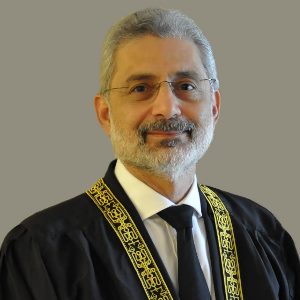Born on October 26, 1959 in Quetta, Justice Qazi Faez Isa is the son of the late Qazi Mohammad Isa of Pishin, who was in the forefront of the Pakistan Movement, and the grandson of Qazi Jalaluddin, the Prime Minister of Kalat State. Justice Isa’s father was the first person from the province to acquire the Bar-at-Law degree and after his return from London helped establish the All India Muslim League in Balochistan and was nominated by Quaid-e-Azam as the President of the Provincial League and had the distinction of serving as the only member on the Central Working Committee of the All India Muslim League from Balochistan.

Begum Saida Isa, Justice Isa’s mother was a dedicated social worker and worked in an honorary capacity on the boards of hospitals and other charitable organizations focusing on education, children and women’s health issues.
Justice Isa was called to the Bar of England and Wales (Middle Temple, 1982) and enrolled as an advocate of the Balochistan High Court and as an advocate of the Supreme Court from Balochistan. He practiced law for over 27 years before all the High Courts of Pakistan, the Federal Shariat Court and the Supreme Court of Pakistan. He became a member of the Balochistan High Court Bar Association, Sindh High Court Bar Association and Life Member of the Supreme Court Bar Association of Pakistan.
Before Justice Isa’s elevation to the High Court he was a senior partner and head of litigation in one of Pakistan’s leading law firms. He rendered his services as amicus curiae when called upon by the High Courts and Supreme Court of Pakistan and had also conducted international arbitrations. He also served on the boards of the largest bank of Pakistan, the Security and Exchange Commission of Pakistan and of the Qauid-e-Azam Mazaar Management Board.
Prior to his elevation Justice Isa regularly wrote on the Constitution, Law, Islam and Environment and his articles were published in Pakistan premier English newspaper. He also co-authored the book: “Mass Media Laws and Regulations in Pakistan” and authored the Report: “Balochistan: Case and Demand”.
After the proclamation of emergency of November 3, 2007, he elected not to appear before judges who had violated their oath. Subsequently, after the Supreme Court declared the action of November 3, 2007 nconstitutional, all the then judges of the High Court of Balochistan tendered their resignation, and on August 5, 2009 Justice Isa was directly elevated to the position of Chief Justice of the High Court of Balochistan.
At the time of his elevation Justice Isa was the solitary judge in the High Court. He nominated judges, all of whom were confirmed, and thus reestablished the High Court of Balochistan. He reopened the High Court at Sibi which had remained closed for a number of years, and acquired land for the construction of the High Court at Turbat and approved the design of its building. He then went on to upgrade all the courts in Balochistan focusing on facilitating access and providing facilities to the public. Justice Isa introduced a system of transparent induction of officials and officers in the High Court after advertising such posts. During his tenure a large number of vacant judicial posts in the subordinate judiciary were filled. Each post was advertised and each applicant had to sit for a series of exams and acquire a minimum pass mark before being invited for an interview.
Justice Qazi Faez Isa took oath as a Judge of the Supreme Court of Pakistan on September 5, 2014. He now lives in Islamabad with his wife who he’s been married to for 36 years. He has a son and a daughter and is blessed with three grandchildren.
Justice Isa’s judgments reflect a strong desire to adhere to the Constitution and the Rule of Law. He is also at pains to safeguard the public interest. The following are extracts from notable judgments rendered by Justice Isa. He wrote a powerful dissent in the case assailing the Twenty-first Amendment to the Constitution, which enabled the trial of civilians by military court (District Bar Association, Rawalpindi v Federation of Pakistan, PLD 2015 Supreme Court 410, at 1158-1209).
“Neither the Federation nor the provinces should invade upon the rights of the other nor encroach on the other’s legislative domain”, wrote Justice Isa (Sindh Revenue Board v Civil Aviation Authority, 2017 SCMR 1344) whilst striking down the imposition of ‘sales tax on services’ imposed on the Civil Aviation Authority, a federal regulatory authority, by the Sindh Legislature.
The Sindh Public Service Commission was directed to perform its statutory role and it and the Government of Sindh were directed to “ensure complete transparency in the process of selection and appointment respectively” of qualified candidates, as their “performance and work would be far superior to the inept allowed in through the back door of nepotism and/or corruption” (In the matter of Suo Motu Regarding Eligibility of Chairman, etc., 2017 SCMR 637, 658 E).
The blatant illegalities committed by the personnel at the helm of the Sindh Coal Authority were noted and it was observed that the Sindh Coal Authority and the Special Initiative Department were “implementing and executing projects and schemes worth 105,906,940,000 rupees. A small clique of persons is put in charge of these massive funds, avoiding established methods of checks and balances and circumventing the prescribed manner of implementing and executing of projects/schemes; which is a matter of grave public concern” (Suo Motu Case No.19 of 2016, 2017 SCMR 683, 699 G).
The National Accountability Bureau (NAB) was castigated when it proposed to enter into a plea bargain with a government servant who was caught red handed with an astronomical cache of Rs.699,967,958; “the acceptance of the plea bargain by the Chairman runs counter to the stated object [of the NAB Ordinance] to ‘eradicate corruption and to hold accountable all those persons accused of such practice’; instead, the message that emanates from NAB is that, if one surrenders only the amount which was seized he will be let off. The rising tide of insidious corruption devastates lives; this Court has repeatedly noted and warned about it, but it seems to no avail” (Khalid Humayun v NAB, PLD 2017 Supreme Court 194).
The state can only engage “private counsel for compelling reasons and in the public interest and not to protect or save a particular individual (as was done in WP 1548) or for any other ulterior reason” wrote Justice Isa. “The Federal Government and the provincial governments have a host of law officers who are paid out of the public exchequer. If a government contends that none amongst its law officers are capable of handling cases then the question would arise why have incompetent persons been appointed. In such a scenario the public suffers twice, firstly, they have to pay for incompetent law officers, and secondly, they have to pay again for the services of competent counsel the government engages. The public exchequer is not there to be squandered in this manner” (Rasheed Ahmad v Federation of Pakistan, PLD 2017 Supreme Court 121).

